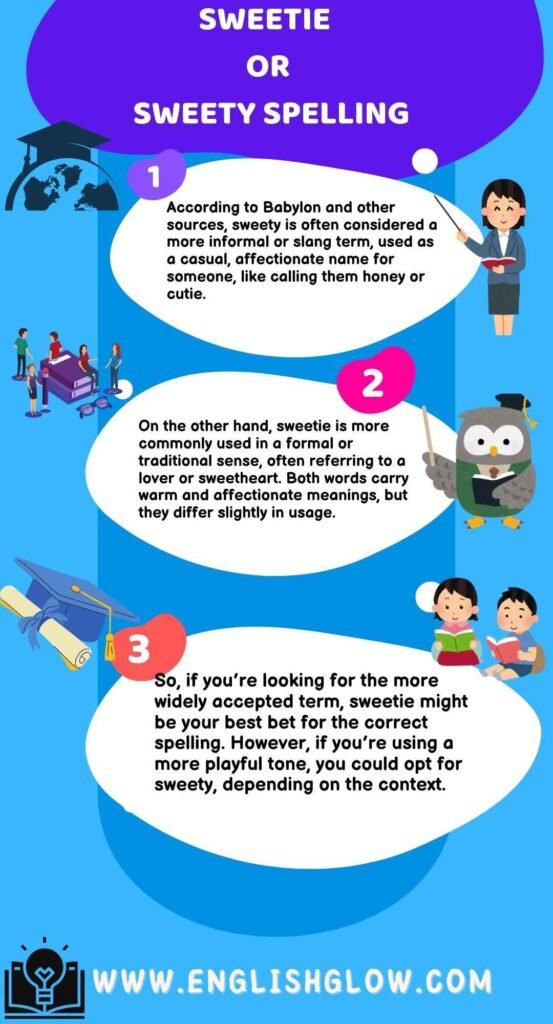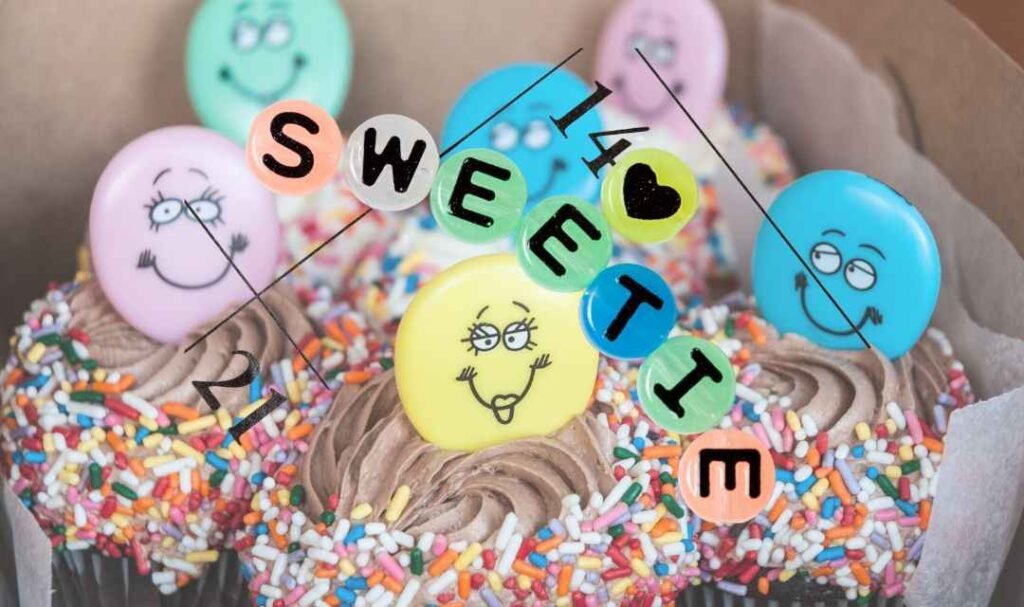When you’re learning English, you may come across similar-looking Sweetie vs Sweety spellings that can cause confusion. For instance, many people in everyday life use both sweety and sweetie without knowing the exact difference. Some wonder which one is the correct spelling. While some dictionaries, like LEO, don’t even have an entry for “sweety,” others do, which can make it tricky to know which to use.
Sweetie or Sweety Spelling
According to Babylon and other sources, sweety is often considered a more informal or slang term, used as a casual, affectionate name for someone, like calling them honey or cutie. On the other hand, sweetie is more commonly used in a formal or traditional sense, often referring to a lover or sweetheart. Both words carry warm and affectionate meanings, but they differ slightly in usage.
So, if you’re looking for the more widely accepted term, sweetie might be your best bet for the correct spelling. However, if you’re using a more playful tone, you could opt for sweety, depending on the context. Either way, understanding these subtle differences will help you make the right choice!
sweetie
When you hear the word sweetie, it often brings up images of affection and warmth, much like holding someone’s fingers or a gentle back rub from a professional. This term is frequently used between close friends and family, signaling a deep connection. You might call your dear friend “sweetie” after a long conversation, or perhaps after they’ve done something kind for you. It’s one of those words that brings comfort, almost like soothing a knot in your stomach when someone you care about addresses you with such affection. This simple word, often shared between friends and lovers, carries the weight of love in its simplicity. Whether you’re talking to a close buyer who’s purchased from you multiple times or sharing a moment with a loved one, “sweetie” transcends boundaries of formality and professional settings.
But “sweetie” isn’t just about emotional connections; in a more practical sense, it’s tied to the world of commodity. Think about when a customer adds little sweeties or extra items to their orders—those are the consumables that keep them coming back, month after month. It’s the small gestures that make all the difference, whether you’re comforting someone with your hands or offering something extra to sweeten the deal. From a business perspective, it’s not just about the big purchases, but about those consistent, thoughtful touches that make your buyer feel appreciated. Whether in relationships or sales, knowing how to manage those delicate, sentimental moments can make a world of difference.
you might enjoy reading: Too Short or To Short? Discover the Common Mistake You’re Likely Making!
For example
The word sweetie is more than just a term of endearment; it carries emotional weight and familiarity. When we talk about “sweetie,” we’re not only referring to a loved one, but also thinking of moments that warm the heart, like the sweetness of jelly or sharing small treats like sweeties with someone special. The term can take different forms, whether it’s spoken in casual conversations or shared in writing. In a deeper sense, the word sweetie almost feels like it fills an emotional void, much like a spoonful of jelly comforts us. It’s the little things in life, such as these, that connect us on a personal level.
On a more linguistic note, the term sweetie often appears in singular forms, much like when people categorically refer to specific sweeties or small treats, tying the word into the language of emotion and existentials. As words are produced and exchanged, it’s interesting to see how they evolve, much like the way jelly might transform into different shapes and textures. The existentials of these terms—how they are used and understood—shift depending on context, yet their core meaning stays sweet and personal.
Sweetie
When it comes to the debate of targeted versus targeted, it is quite similar to the confusion between sweety and sweetie. Both forms might look acceptable to some, but there’s often one version that’s recognized as the correct spelling. In this case, targeted is the preferred spelling, just like how “sweetie” is favored over “sweety” in most contexts. This small difference can make a big impact, whether you’re addressing a marketing targeted audience or writing a heartfelt message to your sweetheart. The way we use and spell these words reflects our attention to detail and our understanding of language conventions.
Much like how sweetie brings to mind terms of endearment such as honey or cutie, the word targeted is often used in business and marketing settings to indicate a specific focus or goal. These small linguistic nuances can affect how we connect with our audience, just like how the right word choices in a story affect the character and tone. Even if it’s a subtle taste in language, much like a piece of candy, the right spelling leaves a lasting impression. If you’re writing professionally or casually, it’s crucial to understand which form is correct, much like how Cambridge or other dictionaries clarify the meanings and correct forms of words.
you might enjoy reading: Other Ways to Say Happy Friday (With Examples)
For examples
especially in online corpora, you’ll find that both sweety and sweetie are used, though the former feels a bit more informal and sometimes even awkward. Similarly, while you might see “targetted” in some older texts or from different sources on the web, it’s always best to go with the standard spelling of targeted. Just as sticky situations can sour your philosophical stomach, getting the spelling wrong can throw off your message, no matter how well-meaning. Remember, whether it’s a singular word like sweetie or a more complex term, accuracy in spelling shapes how others perceive your communication.
What is “sweetie”?
“Sweetie” is a term of endearment used to express affection or love for someone. It is often used to address a person in a kind, loving, or gentle way, usually in relationships where people care for each other (like family members, romantic partners, or close friends).
2. How do you use “sweetie” in a sentence?
- “Good morning, sweetie! How did you sleep?”
- “Don’t worry, sweetie, everything will be okay.”
- “You’re such a sweetie for helping me with this project!”
3. Who do we call “sweetie”?
We call someone “sweetie” when we feel close to them and want to express affection. It can be used for:
- Romantic partners: A husband or wife might call each other “sweetie.”
- Family members: Parents often call their children “sweetie.”
- Close friends: Friends may use it casually, depending on how close they are.
It’s not typically used for strangers or people in formal situations, as it can sound too personal.
4. What is the difference between “sweet” and “sweetie”?
- Sweet: This word can describe someone’s personality or behavior. If someone is “sweet,” they are kind, caring, or considerate. It can also describe the taste of something (like sugar).
- Example: “She is such a sweet person.” “The cake is very sweet.”
- Sweetie: This is a noun or a term of endearment, usually used to refer to someone in a loving way.
- Example: “Thanks, sweetie, for helping me with the groceries.”
In short, “sweet” is an adjective, and “sweetie” is a noun used to show affection.
You might enjoy reading: Maximal vs Maximum: Discover the Crucial Difference




